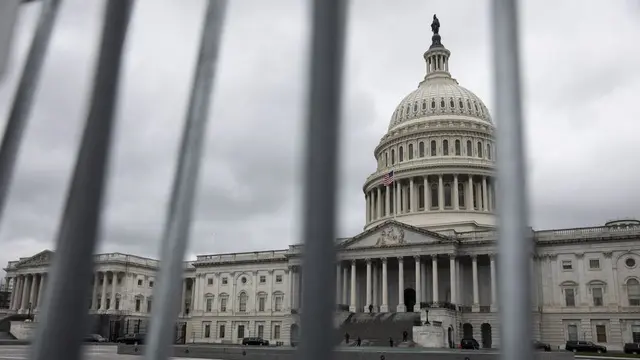The entities behind 13 U.S. presidential libraries, going back as far as then U.S. President Herbert Hoover, released a joint statement on September 7, calling for a recommitment to the country's principles, respect for institutions, and greater civility in politics. The statement did not name names, but it was clearly meant to call out former U.S. President Donald Trump and his ongoing criminal proceedings, prompted by his alleged attempt to defraud voters and overturn the results of the 2020 presidential election.
Mark Updegrove, president and CEO of the LBJ Foundation, told the Associated Press, "I think there's great concern about the state of our democracy at this time." He said, "We don't have to go much farther than January 6 to realize that we are in a perilous state," referring to the march on the Capitol building on January 6, 2021, that saw Trump supporters storm the building in an attempt to intimidate Congress and the vice president to not certify the results of the election.
American democracy is certainly at a crossroads. Speaking anecdotally, every time I return to the country I'm struck by just how hostile the most basic conversations are, how everyone dismisses each other as bad actors for just wanting to have a conversation, and the downright decline of civil society. I think that, certainly, no mainstream political party is absolved from contributing to this environment – but there are definitely some very loud voices in politics that do not deserve to be in the public discourse.
Trump has yet to concede the results of the election, painting himself as a victim of unfair political attacks and has undermined the principal value of American democracy: the peaceful transition of power. This has created a standard where candidates can – despite all evidence – maintain that they actually won the election, casting doubt on the rightful winner.
There is little doubt that this has been a major factor contributing to U.S. President Joe Biden's inability to unite the country, in addition to his own policies that do not address the systemic causes of Americans' anxiety. Trump's Republican Party and its base have bought so deep into the conspiracy that Biden stole the election that most Republican voters did not believe Biden is the real president. That is a serious problem for the country's institutions to maintain legitimacy.
Since the emergence of Trump, we have also seen extraordinarily racist, xenophobic, misogynistic, and other hateful views become mainstream. To be clear, there is no decorum for such views. If someone has political views that deny the personhood and humanity of entire swaths of the population, this is not an abstract disagreement on politics. This is hate speech that must be dealt with as such. American society, given the country's extensive history of racism that culminated in a civil war during the 19th century, cannot withstand such views being promulgated.
At the same time, the widely disproven "Russiagate" conspiracy theory, which alleged that Donald Trump was materially supported by Moscow to win the presidential election in 2016 undermined Trump's presidency from start to finish. He was riddled with controversy, negative press, and impeachment inquiries, plus the Democratic Party base refused to acknowledge him as the president, which contributed to the current political situation.
Aside from these partisan differences, there are also real material concerns that drive a lack of faith in institutions. For example, the current economic figures in America look better than in recent years: Jobs are growing, job satisfaction is up, wages are growing, and inflation is down. Yet the majority of Americans still feel that things are bad and politicians are not addressing these concerns, let alone acknowledging them.
In a recent June analysis, the Federal Reserve put it bluntly: "The share of adults doing at least okay financially fell sharply in 2022 and was among the lowest observed since 2016. This decline in financial well-being occurred broadly across the population." The Federal Reserve Bank of New York also noted that "the majority of the population works and holds no capital, while a small minority holds a large amount of capital and manages it full time." These realities are reducing trust in the current economic scheme, feeding into the notion that working harder won't produce tangible results and the so-called American dream is dead.
With all of this in mind, it's safe to say that there are myriad contradictions in the United States that are making its political system more fragile. It is very hard to predict exactly where things will go given the pervasive issues on seemingly every side.
However, due to the lack of an organized working-class movement and the fact that the country's far-right is highly disciplined, the most likely long-term scenario is that the U.S. political system will eventually capitulate to the authoritarian right. As it relates to the rest of the world, the U.S. will continue down its current protectionist trajectory, contributing to Washington's declining global influence.
(CGTN)
 简体中文
简体中文

